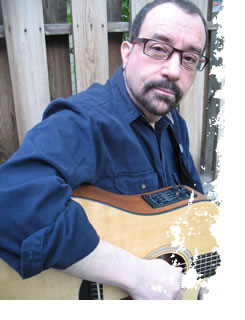

How Cleveland Helped To Save the World in the '60s
and What I'm Doing about It Now
The folk music revival of the early 1960s and the singer-songwriter movement that grew
out of it, in the middle and late '60s, helped, in no small part, to save the world. It's a
long story, which I'm not going to go into right now. But I can prove it. And I plan to do
that in a book I'm writing about it. But, as I said, I'll skip all of the details for now. So just
take my word for it. Or at least go along with the premise.
So, now that we're in agreement about folk-rock music having saved the world, let's talk about Cleveland's role in it. There are many connections - like Cleveland's folk venues La Cave (near University Circle) and Farragher's (in Cleveland Heights), and lots of Cleveland characters who sang and wrote songs, or became local leaders of all sorts of social movements.
 But if you had to pick one person, the choice would be clear ... except that you'd have
But if you had to pick one person, the choice would be clear ... except that you'd haveto pick two people. Because you'd have to pick Phil Ochs, who became arguably the most prolific and best known protest songwriter (Bob Dylan essentially stopped writing protest songs after his third album). But if you're picking Phil Ochs, you also really have to pick Jim Glover, who was responsible for Phil Ochs becoming Phil Ochs.
Here is the super-simplified story: Glover is a Cleveland Heights native. Ochs's family moved to Cleveland Heights from New York at around the time he started college at Ohio State University, in the early '60s. Glover and Ochs met when they became freshman dorm mates at OSU. Glover, who had always been interested and actively involved in left-wing politics and causes, sparked that interest in Ochs. He also taught Ochs, who was a talented clarinetist, to play guitar and encouraged him to start singing.
The two began singing together in coffeehouses and then in folk clubs. But they soon split up, as musical partners. Glover moved to New York City's Greenwich Village and Ochs followed. They started playing the Village clubs. Glover started singing with another folk singer and instrumentalist, Jean Ray, as Jim and Jean. That duo signed a recording contract with the national Philips label, put out an album of mostly traditional folk music and appeared on national TV shows.
In the meantime, Ochs started appearing at folk venues and played a gig at Farragher's in Cleveland Heights. He'd been lured there by the offer to open for one of his most- admired folk singer-songwriters, Bob Gibson, who had released several albums on Elektra Records. Ochs wrote his first song with Gibson at Farragher's.
 At about the same time, Jim and Jean signed with a folkier label than Philips - Verve
At about the same time, Jim and Jean signed with a folkier label than Philips - VerveFolkways - and Ochs signed with Elektra, which, under the leadership of its visionary founder and president Jac Holzman, was on its way to becoming the premiere label of the singer-songwriter movement. Jim and Jean, now doing early folk-rock, recorded a lot of Ochs's songs, as did many other artists. Ochs put out several albums on Elektra, becoming one of the most influential singer-songwriters in history.
Ochs may not have put out as many albums had he been signed to another label, one that cared more about massive commercial success than it did about good music and integrity, which Elektra did.
During that period, Elektra also released albums by Tom Paxton, Judy Collins, Tom Rush, Tim Buckley, Bob Gibson, Hamilton Camp, and other great singer-songwriters. And Collis and Rush also became known for not only interpreting and recording songs by other writers, but in some cases, introducing those writers' songs to the world. Such was the case with James Taylor, Joni Mitchell, Leonard Cohen and Jackson Browne.
So what am I doing about it? My group, Long Road - "Cleveland's favorite (and only) '60s-style folk group" - has performed a concert at Cain Park every summer for the past fours years, each one with a theme. This year marks the 60th anniversary of Elektra Records' founding. So this year we're doing a concert that's a tribute to Elektra Records in the '60s. And that's the title of the concert - well, half of it, anyway. It's called "The Power and the Glory: A Tribute to Elektra Records in the '60s." (The first part is a Phil Ochs song title.)
We're doing songs by all those artists mentioned above, and many others. Long Road is composed of six musicians who have been playing professionally for a collective total of more than 200 years (though none of us actually is that age). You'd like us. We play combinations of 16 instruments, we all sing and there's a lot of vocal harmony.
The concert - which is a fund-raiser for the education organization Roots of American Music - takes place in Cain Park's Alma Theater on Tue 7/27, at 7PM. Tickets are $20 in advance, $23 day of show - a small price to pay, I think, for songs that helped to save the world. Buy tickets at 216-371-3000, or http://www.cainpark.com.
 David Budin is a freelance writer and a folk and rock musician, whose folk group, Long Road, performs occasionally. He is a former editor of Northern Ohio Live and Cleveland Magazine.
David Budin is a freelance writer and a folk and rock musician, whose folk group, Long Road, performs occasionally. He is a former editor of Northern Ohio Live and Cleveland Magazine. His writing focuses on the arts, and especially on pop culture and pop music history. He is currently working on two pop-music-related books.